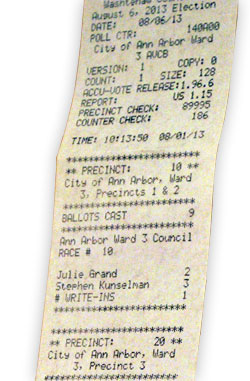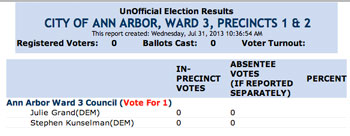Absent Voter Law: Ann Arbor Complies Early
Next Tuesday, Ann Arbor voters will choose the Democratic nominees to appear on the November ballots for city council seats in two of the city’s five wards: Ward 3 and Ward 4.

Electronic tabulation equipment for the Aug. 6, 2013 election. From left: Ann Arbor city clerk Jackie Beaudry, deputy clerk Jennifer Alexa, and chief of police John Seto. Beaudry and Seto are members of the city election commission. The third member is city attorney Stephen Postema, who was absent from this Aug. 1 meeting.
Ballots cast by absent voters in the Aug. 6 primary election will be handled a bit differently than in previous elections – which will bring the city into early compliance with a state law enacted last year. It means that the election results for absent voters will be broken down by precinct. [.pdf of Act 272 of 2012]
The basic approach to counting absent voter ballots in this election will be consistent with the procedure used in the last few years: In elections when precinct delegates for political parties are not being selected by voters, absent voter count boards are established – separate from the in-person precinct polling places.
The alternative would be to transport the absent voter ballots to each precinct location, where election workers at the precincts would feed the absent ballots through the same machine that counts in-person votes.
So for the Aug. 6 count, two separate absent voter count boards will be established – one for Ward 3 and one for Ward 4.
What’s different this year is compliance with Act 272 of 2012, which requires a precinct-by-precinct count within the set of absent voter ballots. The new law applies to elections that take place after July 1, 2014, but the city is complying with that procedure for this primary election.
In past years, election results for absent voter count boards were aggregated by ward, and were not broken out by precinct.

Counting machine tape from the test of electronic tabulation equipment conducted on Aug. 1, 2013, showing absent voter totals broken down by precinct.
Compliance with the new law was already evident during a required public test of the electronic tabulators, which was conducted by Ann Arbor’s election commission on the morning of Aug. 1. The tapes generated by the counting machines for absent voter ballots showed results broken down by individual precinct.
The public test of the equipment is a requirement under state election law and rules promulgated by the secretary of state.
Voters in Ward 3 will choose between incumbent Stephen Kunselman and Julie Grand. In Ward 4, the choice is between incumbent Marcia Higgins and Jack Eaton. No Democratic primary is contested in Wards 1, 2 or 5. No Republican primaries are contested in the city.
Coverage of the campaigns is categorized in The Chronicle as “2013 primary election.”
Based on the number of absentee ballots returned by voters so far, interest in the Ward 3 election this year seems at least as solid, if not slightly stronger, as in a comparable past primary. A summary through Aug. 1 provided by the city of Ann Arbor clerk’s office shows 334 voters in Ward 3 have voted using an absentee ballot. In the 2011 Ward 3 primary, 286 people voted using an absentee ballot.
In Ward 4 this year, a total of 419 people have voted with an absentee ballot in the primary election. [.pdf of Aug. 1, 2013 AV ballot summary]
The Washtenaw County clerk’s office is prepared to accommodate the finer-grained breakdown of absentee voter totals in its online reporting of election results. According to deputy clerk Ed Golembiewski, who serves as director of elections for the county, a new template will be used, which provides a view of the data that breaks down the absentee voter totals by precinct.

Screenshot of test website for Washtenaw County clerk election results. This view will show the in-person and absentee votes cast in the combined Precincts 1 & 2 for Ward 3.
The Chronicle could not survive without regular voluntary subscriptions to support our coverage of civics and government affairs. Click this link for details: Subscribe to The Chronicle. And if you’re already voting for us, please encourage your friends, neighbors and colleagues to help support The Chronicle, too!



